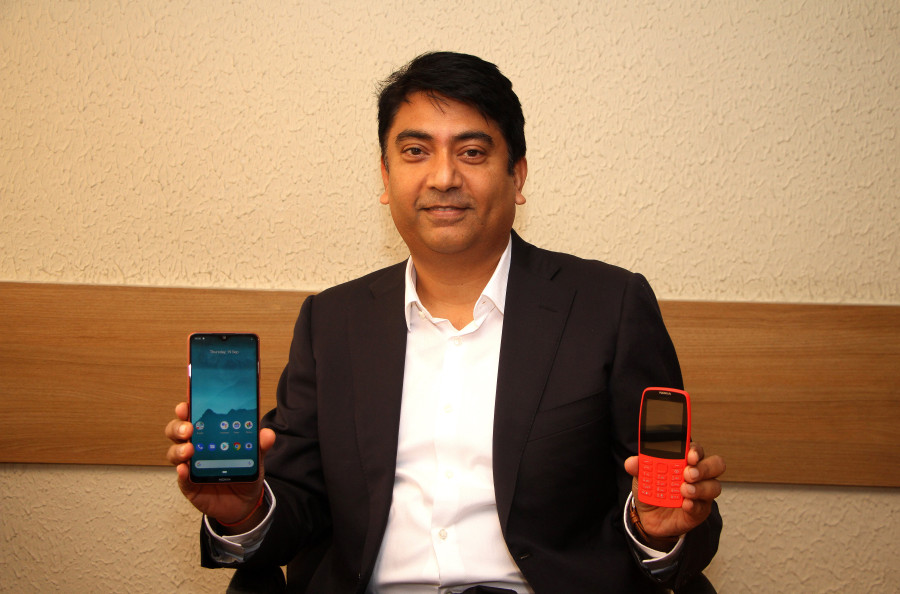Money
'We are striving to get listed among the top five smartphone makers'
The smartphone market outside the Valley continues to be big for Nokia. Almost 65 percent of the sales take place outside the valley.
Krishana Prasain
In 2016, Microsoft sold the Nokia brand to HMD Global, a Finnish company headquartered in Helsinki. HMD Global, a tech start-up company is a licensee for the Nokia brand for phones and tablets. The company is now partnering with Teletalk for the authorised distribution of Nokia phones in Nepal. Before the partnership with Teletalk, Paramount Electronics was the sole distributor of Nokia phones in Nepal. Ravi Kunwar, regional head — Asia Pacific of Nokia, was recently in Kathmandu. Krishana Prasain of the Post caught up with Kunwar to talk about the new partnership, the Nepali smartphone market and new products. Excerpts:
What do you think about the Nepali smartphone market?
It is a growing market. People here are continuing to buy a lot of smartphones. I think connectivity and the 4G revolution are also catching up. There is a strong market for feature phones in Nepal, especially outside the Kathmandu Valley. We see it very positively, and that’s why we continue to launch new phones to cater to consumer demand in the market.
Nokia is partnering with Teletalk for national distribution. How do you expect this partnership to fare?
Nokia as a brand continues to be loved over a period of time. We were never out of this market. In the last two and a half years, we have launched multiple products in the Nepali market and globally. We recently announced almost five new feature phones and two new smartphones, and they are coming to the Nepali market very soon. We continue to evaluate options on channel partners and what works best to take our products to a wide range of stores across some markets and e-commerce platforms. We have tied up with Teletalk to take care of the distribution part.
What is the market share of Nokia in different handset segments?
We are global leaders in feature phones, and we are performing well in the Nepali market too. In the smartphone segment, our global mission is to be among the leading players and get listed among the top five smartphone makers in the coming three to five years.
How are other Nokia devices faring in the market? What are the problems facing the smartphone market?
Of late, we have announced five new feature phones—Classic 105, Nokia 110, Nokia 220 flip phones, Nokia 2720-Classic Flip and Nokia 800. We are planning to bring some of these phones into the Nepal market very soon. In smartphones, we have launched the 6.2 and 7.2 plus; we already have the existing devices such as the Nokia 2.2, 3.2 and 4.2. Every consumer wants the best at the lowest price, which is challenging for us. The manufacturer needs to predict consumer interest and demand and design the product accordingly, which is a challenge.
To which segment of handsets are customers mostly attracted? What about your after sales service?
The best selling feature phone is the Classic Nokia 105 with sales in the millions globally. Of late, the Nokia 2.2 smartphone has found good consumer attraction, besides the Nokia 3.2. We share a very unique proposition for feature phones as we have a replacement warranty. So we do not repair our feature phones. Instead, we replace them with a new one, and that is a very strong consumer promise by the company. For smartphones, we have the standard policy which is very consumer-friendly, we have consumer care centres. In Nepal, we have pick-up points for our phones, and we try to ensure that consumer problems get resolved within a short time span.
How is the market for Nokia phones outside the Kathmandu Valley? How is Nokia's market coverage across Nepal?
The smartphone market outside the Valley continues to be big. Almost 65 percent of the sales take place outside the valley. There is a sizeable population outside which is buying these phones. The numbers for feature phone sales are also quite big outside the Valley.
Have sales of grey smartphones decreased after the implementation of mandatory registration of the IMEI number under the Equipment Identity Registration (EIR) system?
We continue to work with various government bodies; and as an organisation, we are sticking to all the standards and local laws. And laws like this one actually help the manufacturers who are doing genuine business. So we welcome these steps. I believe that if you are doing your business in the right format, the grey stuff definitely gets affected.




 13.12°C Kathmandu
13.12°C Kathmandu













